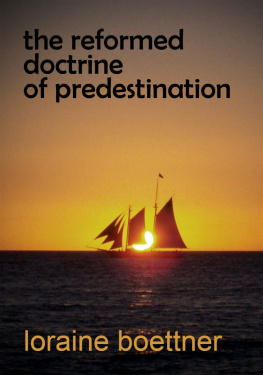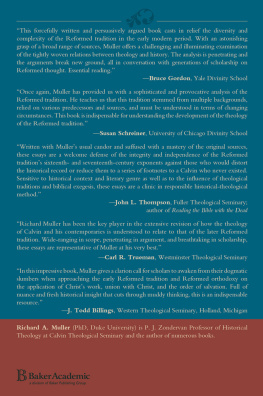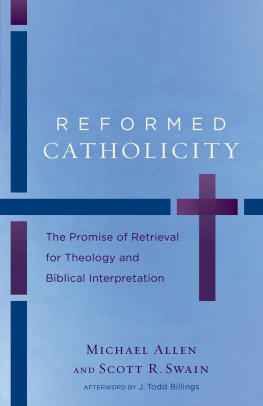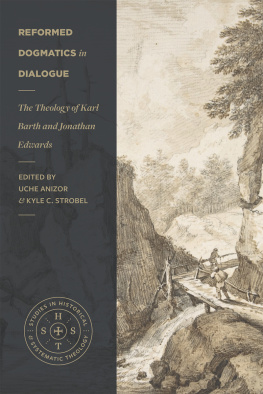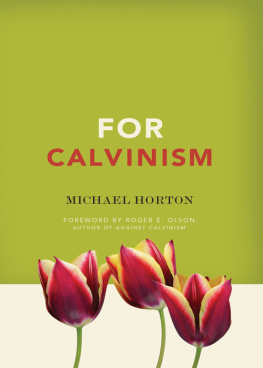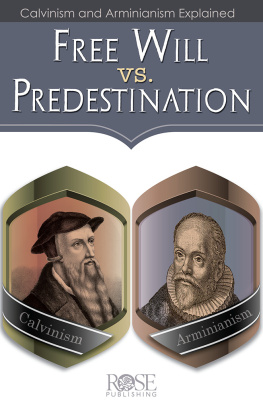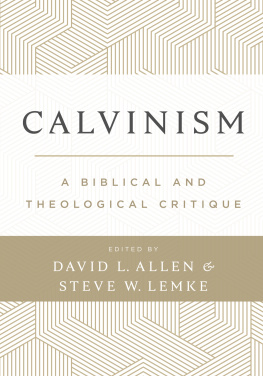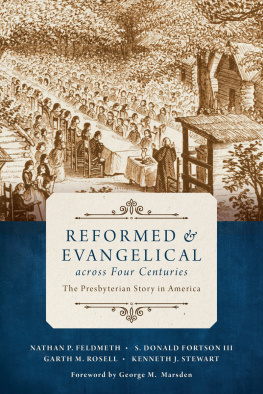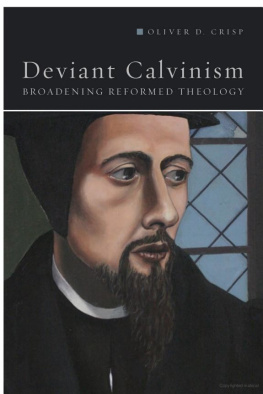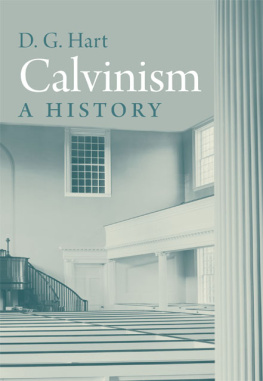Boettner - The Reformed Doctrine of Predestination
Here you can read online Boettner - The Reformed Doctrine of Predestination full text of the book (entire story) in english for free. Download pdf and epub, get meaning, cover and reviews about this ebook. year: 2011, publisher: Primedia eLaunch, genre: Science. Description of the work, (preface) as well as reviews are available. Best literature library LitArk.com created for fans of good reading and offers a wide selection of genres:
Romance novel
Science fiction
Adventure
Detective
Science
History
Home and family
Prose
Art
Politics
Computer
Non-fiction
Religion
Business
Children
Humor
Choose a favorite category and find really read worthwhile books. Enjoy immersion in the world of imagination, feel the emotions of the characters or learn something new for yourself, make an fascinating discovery.
The Reformed Doctrine of Predestination: summary, description and annotation
We offer to read an annotation, description, summary or preface (depends on what the author of the book "The Reformed Doctrine of Predestination" wrote himself). If you haven't found the necessary information about the book — write in the comments, we will try to find it.
Boettner: author's other books
Who wrote The Reformed Doctrine of Predestination? Find out the surname, the name of the author of the book and a list of all author's works by series.
The Reformed Doctrine of Predestination — read online for free the complete book (whole text) full work
Below is the text of the book, divided by pages. System saving the place of the last page read, allows you to conveniently read the book "The Reformed Doctrine of Predestination" online for free, without having to search again every time where you left off. Put a bookmark, and you can go to the page where you finished reading at any time.
Font size:
Interval:
Bookmark:
The Reformed Doctrine of Predestination
B y
Lorraine Boettner
The purpose of this book is not to set forth a new systemof theological thought, but to give a re-statement to that great system which isknown as the Reformed Faith or Calvinism, and to show that this is be yond all doubt the teaching of the Bible and of reason.
The doctrine of Predestination receives comparativelylittle attention in our day and it is very imperfectly understood even by thosewho are supposed to hold it most loyally. It is a doctrine, howeve r, which is contained in the creeds of mostevangelical churches and which has had a remarkable influence both in Churchand State. The official standards of the various branches of the Presbyterianand Reformed Churches in Europe and America are thoroughl y Calvinistic. The Baptist and Congregational Churches, although they have no formulated creeds,have in the main been Calvinistic if we may judge from the writings andteachings of their representative theologians. The great free church of Hollandand alm ost all the churches of Scotland areCalvinistic. The Established Church of England and her daughter, the Episcopal Church of America, have a Calvinistic creed in theThirty-nine Articles. The Whitefield Methodists in Wales to this day bear thename of "Ca lvinistic Methodists."
Among the past and present advocates of this doctrine areto be found some of the world's greatest and wisest men. It was taught not onlyby Calvin, but by Luther, Zwingli, Melanchthon (although Melanchthon laterretreated toward the Semi-Pelagian position), by Bullinger, Bucer, and all of the outstandingleaders in the Reformation. While differing on some other points they agreed onthis doctrine of Predestination and taught it with emphasis. Luther's chiefwork, "The Bondage of the Will," shows that he went into the doctrine asheartily as did Calvin himself. He even asserted it with more warmth andproceeded to much harsher lengths in defending it than Calvin ever did. And theLutheran Church today as judged by the Formula of Concor d holds the doctrine of Predestination in a modified form. The Puritansin England and those who early settled in America, as well as the Covenanters in Scotlandand the Huguenots in France, were thorough-going Calvinists; and it is little credit tohistor ians in general that this fact has been so largely passed over insilence. This faith was for a time held by the Roman Catholic Church, and at no time has that church everopenly repudiated it. Augustine's doctrine of Predestination set against himall the half-hearted elements in the Church andarrayed him against every man who belittled the sovereignty of God. He overcamethem, and the doctrine of Predestination entered the belief of the universalChurch. The great majority of the creeds of historic Chris tendom have set forth the doctrines of Election, Predestination, and final Perseverance, as will readily be seen by any one whowill make even a cursory study of the subject. On the other hand Arminianismexisted for centuries only as a heresy on the outsk irtsof true religion, and in fact it was not championed by an organized Christianchurch until the year 1784, at which time it was incorporated into the system ofdoctrine of the Methodist Church in England. The great theologians of history, Augustine, Wy cliffe, Luther, Calvin, Zwingli, Zanchius, Owen, Whitefield, Toplady, and in more recent times Hodge, Dabney,Cunningham, Smith, Shedd, Warfield, and Kuyper, held this doctrine and taught it with force. That they havebeen the lights and ornaments of the h ighest type ofChristianity will be admitted by practically all Protestants. Furthermore, their works on this great subject havenever been answered. Then, too, when we stop to consider that among non-Christian religionsMohammedanism has so many millions who believe insome kind of Predestination, that the doctrine of Fatalism has beenheld in some form or other in several heathen countries, and that the mechanistic anddeterministic philosophies have exerted such great influences in England, Germany, and America, we see that this doctrine is at leastworthy of careful study.
From the time of the Reformation up until about one hundredyears ago these doctrines were boldly set forth by the great majority of theministers and teachers in the Protestant church es;but today we find far the greater majority holding and teaching other systems.It is only rarely that we now come across those who can be called"Calvinists without reserve." We may quite appropriately apply to ourown churches the words of Toplady in regard to theChurch of England: "Time has been when the Calvinistic doctrines wereconsidered and defended as the Palladium of our Established Church; by herbishops and clergy, by the universities, and the whole body of the laity. It was(during the reig ns of Edward VI, Queen Elizabeth, James I, and the greater part of Charles I) asdifficult to meet with a clergyman who did not preach the doctrines of theChurch of England, as it is now to find one who does. We have generallyforsaken the principles of t he Reformation, andIchabod, or 'the glory is departed,' has been written on most of ourpulpits and church-doors ever since."
The tendency in our enlightened age is to look uponCalvinism as a worn-out and obsolete creed. At the b eginningof his splendid article on "The Reformed Faith in the Modern World,"Prof. F. E. Hamilton says, "It seems to be tacitly assumed by a largenumber of people in the Presbyterian Church today that Calvinism has beenoutgrown in religious circles. In fact, the average church member, or even minister of the gospel, is inclined to look upon a person whodeclares that he believes in Predestination, with a glance of amused tolerance. Itseems incredible to them that there should exist such an intellectual curiosity as a real Calvinist, in an age of enlightenment like thepresent. As for seriously examining the arguments for Calvinism, the idea never enterstheir heads. It is deemed as out of date as the Inquisition, or the idea of a fiat world, and is looke dupon as one of the fantastic schemes of thought that men held before the age ofmodern science." Because of this present day attitude toward Calvinism,and because of the general lack of information concerning these doctrines, weregard the subject of th is book as one of greatimportance.
It was Calvin who wrought out this system of theologicalthought with such logical clearness and emphasis that it has ever since bornehis name. He did not, of course, originate the system but only set forth what appeare d to him to shine forth so clearly from the pages of HolyScripture. Augustine had taught the essentials of the system a thousand yearsbefore Calvin was born, and the whole body of the leaders of the Reformationmovement taught the same. But it was given to Calvinwith his deep knowledge of Scripture, his keen intellect and systematizinggenius, to set forth and defend these truthsmore clearly and ably than had ever been done before.
We call this system of doctrine "Calvinism," andaccept the term "Calvin ist" as our badge ofhonor; yet names are mere conveniences. "We might," says Warburton, "quite as appropriately, and with equally as much reason, call gravitation 'Newtonism,' becausethe principles of gravitation were first dearly demonstrated by the gre at philosopher Newton. Men had been fully conversant withthe facts of gravitation for long ages before Newton was born. These facts hadindeed been visible from the first days of creation, inasmuch as gravitation was one of thelaws which God ordained for the governing of theuniverse. But the principles of gravitation were not fully known, and the far-reaching effects of itspower and influence were not understood until they were discovered by Sir IsaacNewton. So, too, was it with what men call Calvinism . The inherent principles of it had been in existence forlong ages before Calvin was born. They had indeed been visible as patentfactors in the world's history from the time of man's creation. But inasmuch asit was Calvin who first formulated these prin ciplesinto a more or less complete system, that system, or creed, if you will, and likewise thoseprinciples which are embodied in it, came to bear his name."
Next pageFont size:
Interval:
Bookmark:
Similar books «The Reformed Doctrine of Predestination»
Look at similar books to The Reformed Doctrine of Predestination. We have selected literature similar in name and meaning in the hope of providing readers with more options to find new, interesting, not yet read works.
Discussion, reviews of the book The Reformed Doctrine of Predestination and just readers' own opinions. Leave your comments, write what you think about the work, its meaning or the main characters. Specify what exactly you liked and what you didn't like, and why you think so.

